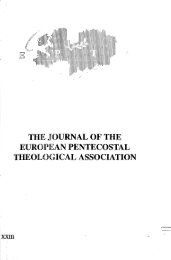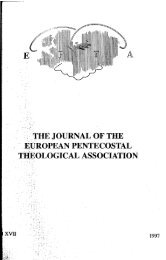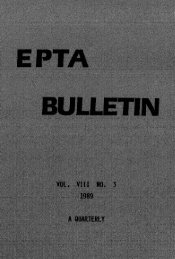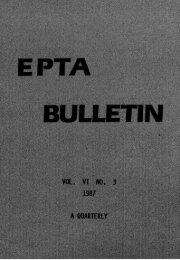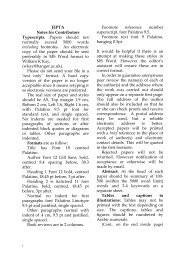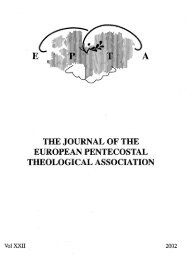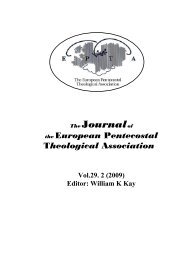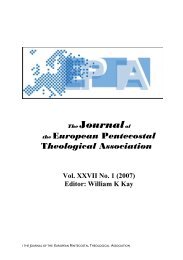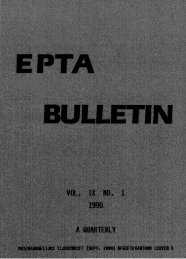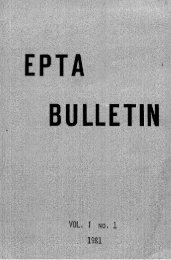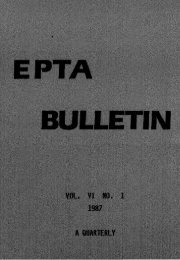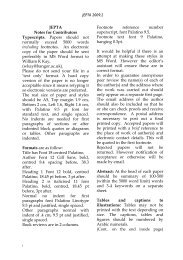jepta 2001 21 - European Pentecostal Theological Association
jepta 2001 21 - European Pentecostal Theological Association
jepta 2001 21 - European Pentecostal Theological Association
You also want an ePaper? Increase the reach of your titles
YUMPU automatically turns print PDFs into web optimized ePapers that Google loves.
The Journal of the <strong>European</strong> <strong>Pentecostal</strong> <strong>Theological</strong> <strong>Association</strong>, Vol. XXI, <strong>2001</strong><br />
The Earliest Days of British <strong>Pentecostal</strong>ism: Neil Hudson<br />
Chri~tianity'.~ With his father, William visited the Cantel's Mission Hall in<br />
Islington and there experienced early <strong>Pentecostal</strong> worship. People sang with their<br />
hands raised, singing in an abandoned, fervent and rapturous manner, 'which<br />
reminded me of the Welsh Revival'.' Choruses were sung repeatedly,<br />
interspersed with spontaneous, improvised singing. No one led the service;<br />
everyone was free to make a contribution. People knelt or sat, cried or laughed,<br />
shouted or sang as they felt the Sprit move them.' His experience of the Baptism<br />
in the Holy Spirit was accompanied by tongues, laughter and shaking. He wrote,<br />
'drunk with the Spirit, I rose and tried to ascend the stairs but could not proceed<br />
until I was assisted up and into the room assigned unto us, ... Laughing<br />
irrepressibly, praising God with abandon."<br />
It was clear to see how this spontaneity could become abused and a cause for<br />
dishonour. As a result, Boddy wrote his series of guidelines for leaders of<br />
<strong>Pentecostal</strong> gatherings. He suggested that I Corinthians 14 must be taken<br />
literally - only 3 people were to beallowed to present messages in tongues at any<br />
one meeting. Caution was given concerning the use of prophecy, in the light of<br />
the disgrace that had been brought upon <strong>Pentecostal</strong> meetings following the<br />
unfulfilled prophecy given in 1907 that declared that Colombo would be<br />
destroyed. He recognised that the 'workings of the unconscious are very, very<br />
deep' aqd that consequently, it was possible for people to present erroneous<br />
words of prophecy.' Similarly, the use of 'The Lord says' was not to be used to<br />
place spoken prophecy on the same canonical level as Scripture. He also felt that<br />
prayers that included too many references to the devil did-more harm than good<br />
by diverting Christians' attention away from the Lord. Because there had been<br />
charges of immorality made against the <strong>Pentecostal</strong>s, Boddy was aware of the<br />
' Ibid, <strong>21</strong>.<br />
' Ibid, <strong>21</strong>-23.<br />
' Ibid, 51-52. His description of reactions to the presence of the Spirit are reminiscent of<br />
general revivalism, whether the experiences of the early Quakers, those attending the Cane<br />
Ridge Revivals, or those receiving the eponymous Toronto Blessing. It had also been the<br />
experience of the Salvation Army in their early days. Brengle wrote, 'shouting and praising<br />
God is to salvation what flame is to fire' (S.L. Brengle, Helps to Holiness, London: Salvationist<br />
Publishing and Supplies, 1927~ [1896], 1<strong>21</strong>. Horridge points to the War Cry reports of<br />
'Revelling on the floor in the Spirit's love' and 'jumping for Jesus' (War Cry, 27 November<br />
1880,3; 'shouting, leaping and lying prostrate' (War Cry, 11 May 1882, 3). They were,<br />
Honidge points out, unashamedly charismatic' (C.K. Horridge, Salvation Army: Origins and<br />
Early Days, 1865-1900, Godalming, Surrey: Ammonite Books, 1993,99-100).<br />
' A.A. Boddy, "The <strong>Pentecostal</strong> Baptism", 2. Undated, but probably written between January-<br />
March 1908. There is a reference to more than 4 months of the <strong>Pentecostal</strong> outpouring in<br />
Britain. This refers to the period September-December 1907; he also refers to more than 60<br />
who are speaking in tongues at the time of publication. We know that Boddy was the 50th<br />
British person to speak in tongues on 4 December 1907, and by April 7, had been recorded as<br />
doing so (Confidence, April 1908,5).<br />
need to safeguard their reputation. Therefore, late meetings, in particular, needed<br />
careful handling. He suggested that young people should not be allowed to stay<br />
to these late meetings, but rather leave earlier with their parents. Marriages<br />
needed to be built up, especially if the marriage was between a Christian and a<br />
nonbeliever. Criticisms needed to be met with strong love. The need of all was<br />
for sanctification so that the scriptural promise would be safeguarded.<br />
Sanctification was deemed to be protection against any misuse of the gifts. In<br />
particular, he felt that it was important not to push young believers into positions<br />
that they would not be able to sustain.'<br />
AN EXAMPLE OF AN EARLY VISITOR TO SUNDERLAND<br />
This advice was borne out of the meetings held in All Saints. Each Thursday,<br />
there was a prayer meeting where 'full salvation for body, soul and Spirit is<br />
proclaimed'.' Alongside these meetings were other gatherings where people<br />
would be prayed for. During the period October-May 1908, numerous visitors<br />
had made their way to the Vicarage to investigate and ultimately receive the<br />
blessing of <strong>Pentecostal</strong>ism. One such early visitor was Smith Wigglesworth, a<br />
man who was to become a colossal <strong>Pentecostal</strong> legend. In 1907, Wigglesworth<br />
was 48 years old. His Christian life reflected most of the evangelical<br />
developments that had dominated in the late nineteenth century. Born into a<br />
strong Methodist family, with a grandmother who had been one of the earliest<br />
Methodists in Yorkshire, he was, unaccountably, confirmed into the Church of<br />
England in 1872. During his early teenage years, he came under the influence of<br />
the Plymouth Brethren, the climax of this relationship being his rebaptism at the<br />
age of 17. The emergence of the Salvation Army attracted him with its sense of<br />
activism and at the age of 20, he joined a Salvation Army corps in Liverpool. He<br />
was the product of the evangelistic fervour of Methodism, Anglican Puritanism,<br />
Brethren holiness and restorationist emphases and the revival activism of the<br />
Salvation ~ rmy.~<br />
Whilst attending the Army, he met and married one of the officers, Mary Jane<br />
(Polly) Featherstone. In line with Army custom, she resigned her commission.<br />
Together they established an independent Mission Hall in Bowland Street,<br />
Manningham, Bradford, complete with a brass band and vigorously engaged in<br />
open-air work.' Regular visitors to Keswick, they were also active supporters of<br />
Reader Harris' work. In his magazine Tongues of Fire, their meeting hall in<br />
Bradford is listed as one of the venues for a <strong>Pentecostal</strong> League of Prayer group.<br />
' Ibid. 2<br />
' A.A. Boddy, These signs shall follow, Leaflet on tongues, no 3, (np, nd), 4.<br />
' J. Hywel Davies, Baptised by Fire: The History of Smith Wigglesworth, (London: Hodder &<br />
Stoughton, 1987,24-34.<br />
' Confidence, February 191 0,35.



